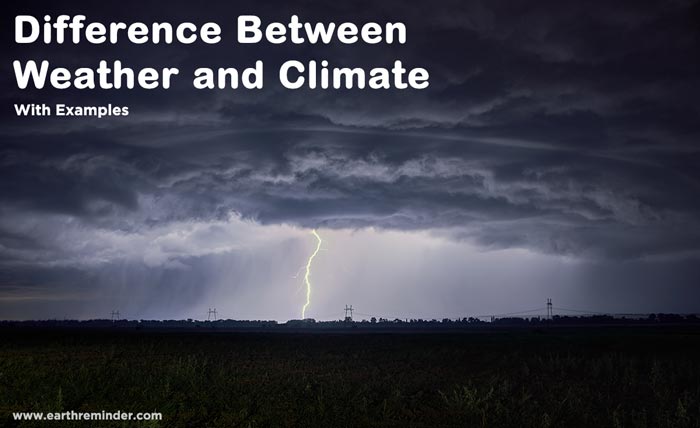What is the Difference Between Weather and Climate?
Weather vs Climate with Examples
You might be aware of two terms like weather and climate. And do you think these two phrases are the same? Well, these are similar but not the same. So, after knowing this, several people get confused and ask, what’s the difference between weather and climate. They seem alike, right?
What are you feeling today, remind yourself? Is it hotter than ever? Is the summer or Rainy season going on? Yes, there are lots of fluctuations in typical weather in different seasons.
Previously, our parents and grandparents had experienced the charming feeling of the first rain after a long hot summer, heavy snowfall in winter, and even the beautiful sun in spring. Do you get the chance of enjoying that pleasant feeling? What happens to our weather? Is it weather or climate? Do you know?
That is why, today in this article, we are going to have a closer view of the significant differences between two daily terms that are weather and climate. So, let’s begin.
Table of Contents
What is the Weather?
Before knowing the exact difference between these two terms, let’s understand what the weather is. Well, the weather is a daily change in our atmospheric conditions over a short period.
There are several types of weather we feel every day. What should we wear, what should we eat, where should we go, everything depends on the weather? For example, if it is raining outside, then it means we should keep an umbrella or raincoat with ourselves. On hot days, we often tell our friends and family, let’s drink some cold drinks and have ice cream.
Different mild weather types include rainy, sunny, cloudy, foggy, snowy, and so on, which can take us to a thunderstorm, tornado, hurricane-like extreme conditions.
Moreover, there are six major factors that decide what the weather will be. Those factors are temperature, humidity, wind, cloudiness, precipitation, and atmospheric pressure. Weather forecasters use these six weather components to decide whether or not it will be a sunny day or a severe typhoon is coming.
Moreover, lots of weather conditions we can see every minute, every hour, every day and in every season, yet, the weather doesn’t remain the same way as we expect. Here comes the concept of climate.
What is Climate?
A climate is the long-term average of daily weather conditions. In other words, we can say the weather is the change in atmosphere for a shorter period, and climate is the atmospheric changes over a more extended period.
We can also say, the weather is what you expect to feel today like rain showers in the rainy season, and climate is what you get. That is a super hot day.
How is Climate Different From Weather?
So, what is the main difference between weather and climate? The above observation of all the definitions explains the only difference between these two terms, that is the extent of time.
According to NASA, the weather forecasters provide around 25 different types of warnings including, Flash Flood Watches and Warnings, Severe Thunderstorm Watches and Warnings, Blizzard Warnings, Snow Advisories, Winter Storm Watches and Warnings, Dense Fog Advisory, etc.
Besides, several coastal or sea level weather forecasts from National Weather Service (NWS) are like Coastal Flood Watches and Warnings, Flood Watches and Warnings, High Wind Warnings, Wind Advisories, Gale Warnings, High Surf Advisories, Heavy Freezing Spray Warnings, etc.
Further, this is crucial to forecast our weather every day as it changes from minute to minute and hours to hour and all of our actions are dependent on what type of weather it will become.
On the other hand, the study of climate by climatologists is more critical as it implies the continuous rise in atmospheric temperature and other meteorological factors. By researching climate, we can understand its negative impacts such as global warming, disruption in the food chain and food web, health hazards, and so on.
Also, the weather is a natural thing that happens every day. However, the climate is a daily fluctuation in natural weather conditions due to several man-made or anthropological causes.
In short, we can say the climate is the regular variation in the weather for an extended period of around 30 years. So, this is the relation or exact difference between weather and climate change.
Difference Between Weather and Climate in Points:
If we compare the main difference between weather and climate with examples, we get the following points:
|
Weather |
Climate |
|
Weather is a short-term condition of the atmosphere. |
Climate is a long-term effect of the atmosphere. |
|
Weather conditions are being studied in a specific area at a particular time. |
Climate is a result of the average of daily weather conditions at a place in a specific time. |
|
It is studied daily for forecasting the upcoming weather. |
The weather factors are studied daily to find the climate after 30 years. |
|
The weather might be taken as one condition of the atmosphere at a time. |
Climate comprises all the weather factors such as atmospheric pressure, temperature, humidity, cloudiness, wind, and precipitation for 30 years. |
|
Weather is what you regularly expect over a season. |
Climate is what the atmosphere behaves over a long period. |
|
The study of weather is essential to know the upcoming condition of the atmosphere. |
Study of climate is essential to know its harmful impact on the environment, and our ecosystem to take precautions earlier. |
|
The scientists who study weather are known as meteorologists. |
The scientists studying the climate are familiar as climatologists. |
|
Meteorology is the study of weather. |
Climatology is the study of climate. |
|
Particular weather at a specific place and time remains for a shorter period. |
Climate changes by the daily variations of weather and remains for a decade or century. |
|
Weather is implied as numerical values given by the crucial meteorological components. |
Climate is expressed by taking averages of all the meteorological factors along with time and places. |
Final words on Weather vs Climate:
Several studies indicate climate change is a result of human activities. Such activities include urbanization, industrialization, increased agriculture, pollution, deforestation, mining, etc. The direct impact cannot be seen regularly.
However, a slight variation in weather occurs every day due to these reasons.
And after three decades, human society as well as the environment and also our ecosystem become the victim of those slight instabilities.
Also, we can better understand the consequences of climate change by studying the difference between weather and climate geography.
Thus, by considering all the statistics of 30 years, the direct anthropogenic impacts of climate change can be summarized as global warming, decreased crop yield, acid rain, environmental degradation, species extinction, and instability in our ecosystem.
We can only cure our environment of such destruction by knowing the primary causes and taking preventive measures before totally submerged in the devastating future.

